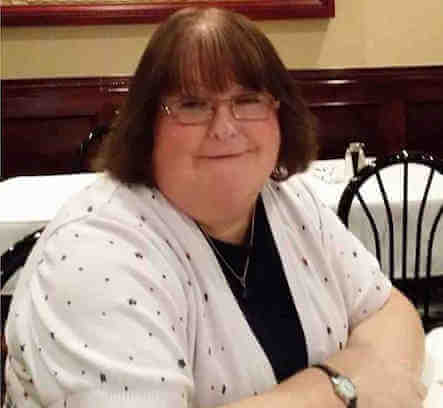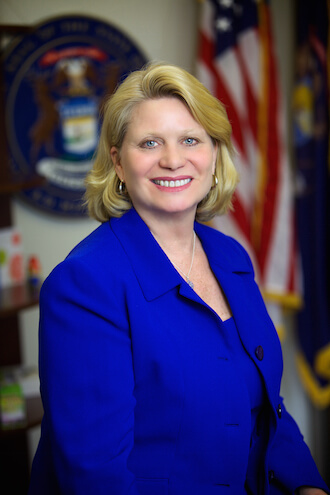Karen Roberts and April Miller are one of the two plaintiff couples in Kentucky. | FACEBOOK.COM
BY ARTHUR S. LEONARD | A federal court has rejected the claim by a Kentucky county clerk that she can refuse to issue any marriage licenses to avoid compromising her religious belief that a marriage can be only between one man and one woman.
Judge David L. Bunning of the Eastern District of Kentucky, on August 12, granted a motion for preliminary injunction against Rowan County Clerk Kim Davis brought by two couples, one same-sex and the other different-sex. Bunning found that the couples — April Miller and Karen Roberts, and Kevin Holloway and Jody Fernandez — are likely to succeed in their claim that Davis’ refusal to issue marriage licenses to either couple violated their constitutional rights.
Davis, represented by Liberty Counsel, a Christian legal defense firm, promptly said she would appeal to the Sixth Circuit Court of Appeals. Several days later, Bunning issued a temporary stay on his injunction, until August 31, to allow Davis to seek a stay from the Sixth Circuit as she proceeds with her appeal.
Claiming religious objection to “ endorsing” same-sex unions, Kim Davis issues no marriage licenses at all
After the Supreme Court’s marriage ruling in June, the two couples sought licenses in Rowan County, but were told none would be issued to any couple. Rowan County Judge Executive Walter Blevins, when asked to issue the licenses given Davis’ refusal, said he was only authorized to do so when the county clerk is “absent.”
Unlike some other states, where clerks have argued the law does not require them to issue marriage licenses, in Kentucky it is clear that county clerks are supposed to issue licenses, so Davis rests her defense on the argument that she has a constitutional right based on the First Amendment and the state’s Religious Freedom Act to refuse to issue any licenses because of her religious objections to being seen to endorse same-sex marriages. The “authorization statement” she is required to complete on all marriage licenses, Davis argued, constitutes “an endorsement of same-sex marriage, which runs contrary to her Apostolic Christian beliefs,” Bunning wrote.
Governor Steve Beshear, a Democrat, tried to talk Davis out of this position, telling her she should resign if she is unwilling to perform her statutory duties. Davis insists she will serve out the remaining three-and-a-half years of her elected term.
Davis also argued that requiring Rowan County couples who want to marry to go to a neighboring county did not impose any substantial burden on their newly-proclaimed 14th Amendment right to marry, as weighed against the significant burden on her freedom of religion in requiring her to issue licenses to same-sex couples. Her decision to deny licenses to different-sex couples, she explained, demonstrates her unwillingness to discriminate against same-sex couples.
Bunning rejected Davis defense, first pointing out that the plaintiffs are “long-time residents who live, work, pay taxes, vote, and conduct other business in Morehead,” the county seat, and so are entitled to prefer getting their licenses locally.
He noted that 57 of the state’s 120 elected county clerks have petitioned for legislation allowing them to refuse to issue licenses to same-sex couples. “If this Court were to hold that Davis’ policy did not significantly interfere with the right to marry, what would stop the other 56 clerks from following Davis’ approach?,” asked Bunning, who concluded that if the practice became widespread, it could become a “substantial interference” with what the Supreme Court has found to be a “fundamental right.”
“There are individuals in this rural region of the state who simply do not have the physical, financial, or practical means to travel” long distances to secure a license, Bunning observed.
Davis’ free exercise rights, he concluded, do not outweigh the state’s interest in upholding the rule of law, under which the plaintiffs were entitled to get marriage licenses.
Bunning also disagreed with Davis’ argument that the “authorization statement” on the marriage license form implied or communicated that she approves of same-sex marriage. It is merely a statement that the applicants are legally qualified to marry, he found.
Davis also attempted to assert a free speech claim under the First Amendment, which Bunning quickly disposed of by pointing to Supreme Court precedents holding that public employees speaking in their official capacity do not enjoy such individual protection. The “speech” Davis is objecting to, he found, is state speech, not Davis’ speech.
“The State prescribes the form that Davis must use in issuing marriage licenses,” Bunning wrote. “She plays no role in composing the form, and she has no discretion to alter it.”
Bunning also rejected her argument that requiring her to issue licenses imposes a constitutionally forbidden “religious test” for her to be a public employee.
“The State is not requiring Davis to express a particular religious belief as a condition of public employment,” he wrote, pointing out that what the state does require is that “all state officials” must “swear an oath to defend the US Constitution.”
Davis now looks for relief to the Sixth Circuit, which last year ruled against marriage equality in the case where the issue prevailed in the Supreme Court this June.



































